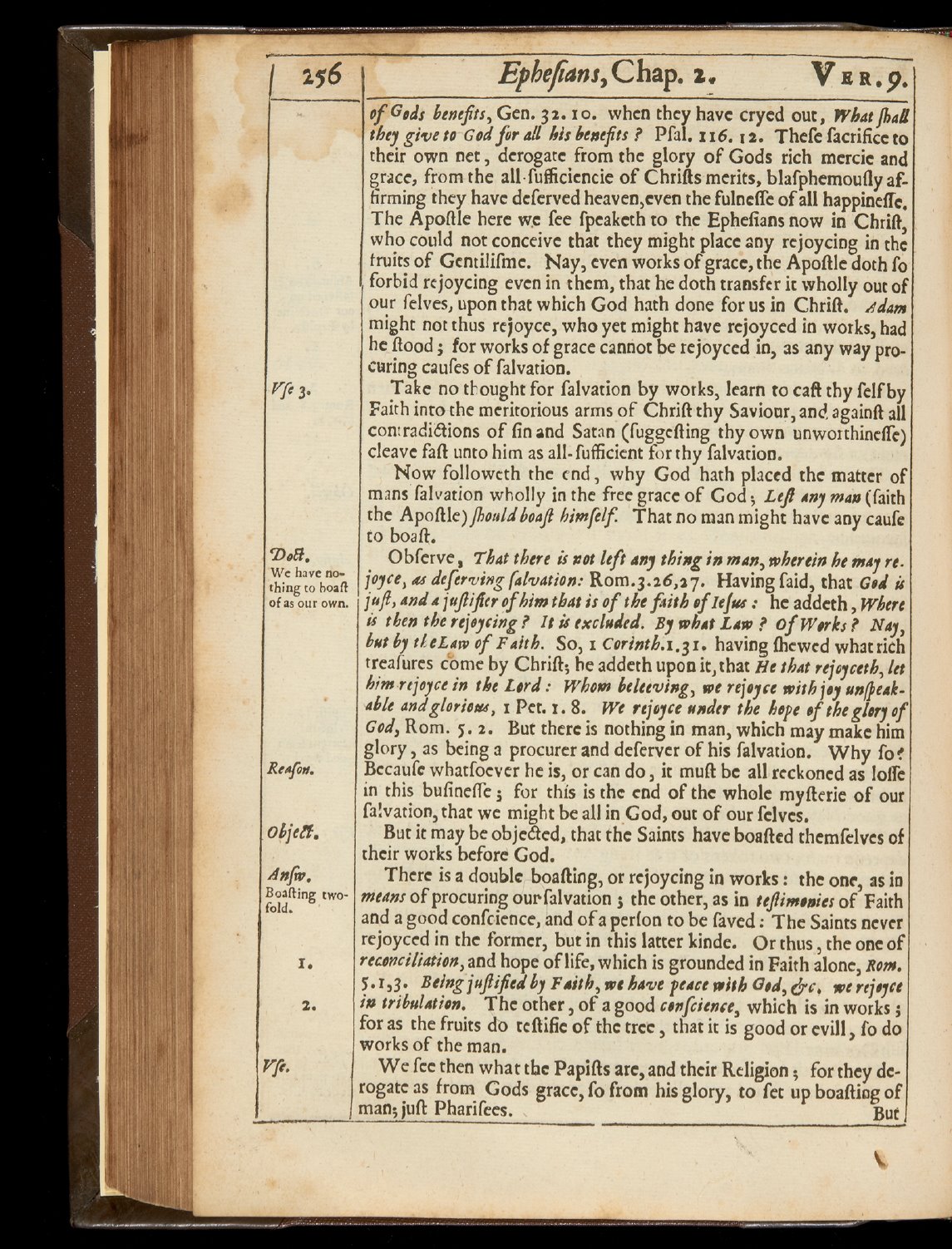

256
0
Ephefrans,
Chap.
z.
V
s x,
9,
Doti.
We
have
no-
thing
to boat}
olas our own.
Re
af
n.
objeti'.
Anfw.
BoaRing two-
fold.
X.
2.
VA.
of
Gods benefits,
Gen.
32.1o.
when
they
have cryed
out,
What
flail
they
give
to
God
fir
all
his
benefits
?
Pfal.
z
r 6.
i
2.
There
facrifice
to
their own net , derogare from
the glory
of
Gods
rich mercie and
grace,
from the all-fuf iciencie
of
Chrifts merits, blafphemoully
af-
firming
they
have deferved heaven,even
the
fulneffe
of
all happineffe.
The Apoftle
here we
fee
fpeaketh
to the
Ephefrans
now
in
Chrift,
who
could
not
conceive
that they might
place any
rejoycing
in
the
fruits
of
Gentilifine.
Nay,
even works
of
grace,the Apoftle doth
fo
forbid rejoycing
even in
them, that
he
doth
transfer it wholly
out
of
our
felves, upon
that which God
hath done for
us in
Chrift.
.Adam
might notthus rejoyce,
who yet might
have rejoyced
in
works,
had
he
flood;
for works
of
grace cannot be rejoyced in,
as
any way
pro-
curing
caufes
of
falvation.
Take no
thought for
falvation
by works,
learn
to
cart
thy
felf
by
Faith
into the
meritorious arms
of
Chrift
thy
Saviour, and
againft
all
con:radiótions
of
fin
and Satan (fuggefling
thy own
unworthineffe)
cleave
fait unto him
as
all- fufficient
for thy falvation.
Now
followeth the
end,
why God hath
placed
the matter
of
mans
falvation
wholly
in
the free grace
of
God
;
Le]
any
man (faith
the Apoftle)/hould
boafl
him
feif.
That
no
man
might
have
any
caufe
to
boaft.
O
bferve,
That
there
is
not
left
any
thing
in
man,
wherein
he
may
re.
joyce, as
deferving falvation:
Rom.3.26,27.
Having faid,
that
God
is
and
a
fulfiller
of
him
that
is
of
the
faith of
lefus
:
he addeth
, Where
is
then the rejoycing?
It
is
excluded.
By
what Law
?
of
Works? Nay,
but
by
tl
eLaw
of
Faith.
So,
r
Corintb.r,3
r.
having
filmed
what
rich
treafures come by
Chrift;
he addeth upon it, that
He
that
rejoyceth, let
him
rejoyce
in
the
Lard
: Whom
belaying,
we
rejoyce
with
joy
un
f
eak-
able
andglorious,
r
Pet.
T.
8.
We
rejoyce
under the
hope
of
the
glory
of
God,
Rom.
s.
2.
But
there
is
nothing
in
man, which may make
him
glory,
as
being
a
procurer
and
deferver
of
his falvation.
Why
fo!
Becaufe
whatfoever
he is,
or
can
do,
it
mutt be all reckoned
as
Io1Te
in
this
bufrneffe; for this
is
the
end
of
the whole myfterie
of
our
falvation,
that
we
might
be all in
God,
out
of
our felves.
But
it
may be objes
led, that the
Saints have boafted themfelves
of
their works before God.
There
is a
double boafting, or rejoycing
in
works
:
the
one,
as in
means
of
procuring ourfalvation ; the
other,
as in
teflimosies
of
Faith
and
a
good
confcience, and
ofa
perron
to
be
faved
:
The
Saints never
rejoyced
in
the former, but
in
this latter kinde.
Or thus,
the
one
of
reconciliation,
and hope
of
life,
which
is
grounded
in
Faith alone,
Rom.
5.
r,3.
Beingjufiifsed
by
Faith,
we
have
peace
with
Gad,
&c.
we rejoyce
in
tribulation.
The
other,
of
a
good
confcience,
which
is in
works
;
for
as
the
fruits
do
teftifie
of
the
tree ,
that
it is
good or evil!,
fo do
works
of
the man.
We
fee
then
what
the Papifts are,
and
their
Religion
;
for they
de-
rogate
as
from Gods grace, fo from
his
glory, to
fet up boafting
of
man;
juft
Pharifees.
But
,

















